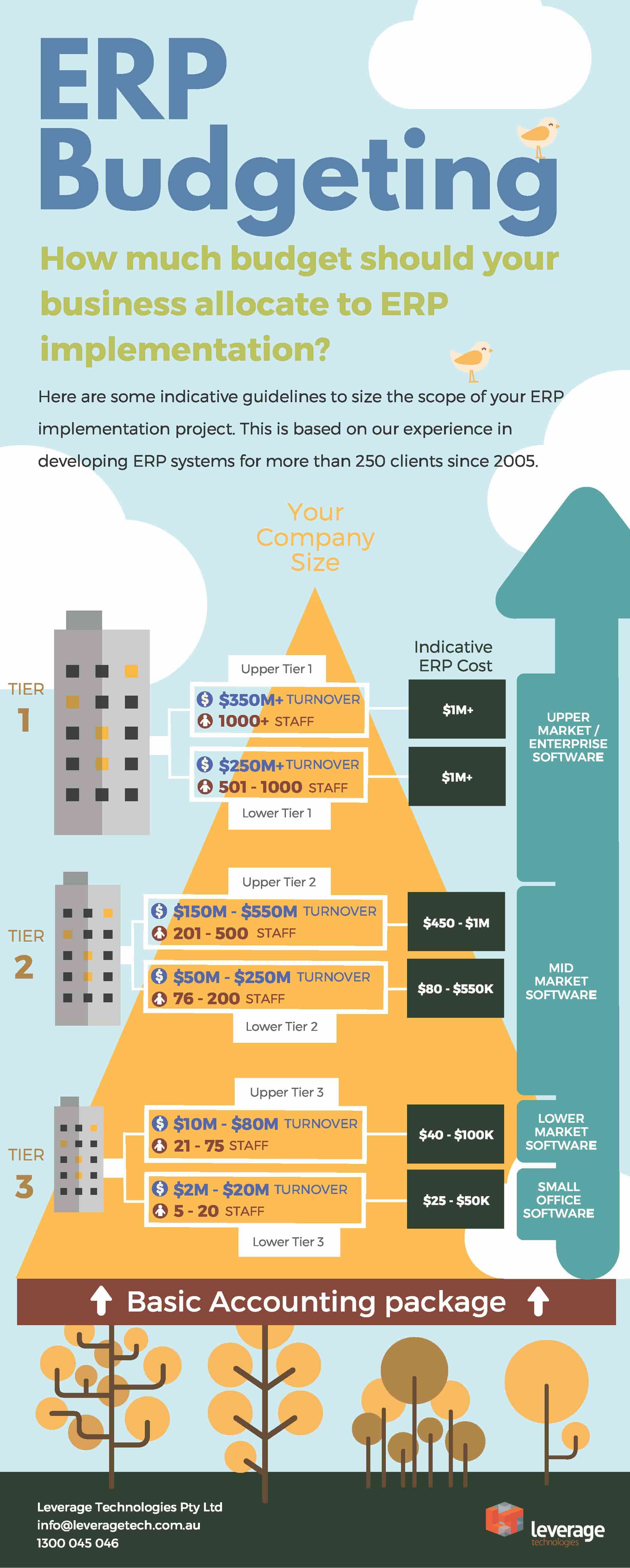ERP Budgeting: How Much Should I Spend on ERP Implementation?
21 Dec 2017 | by Brett Mundell
How much budget should a company of your size allocate to your Enterprise Resource Planning implementation project?
Before you even start researching your options, you may want to get a high-level understanding of what ERP actually costs.
The cost of an ERP implementation depends on multiple factors such as:
- Size of your business
- Number of ERP users
- Requirements and integrations
- Deployment options
- Customisations
In this infographic, we will try to give you an indicative reference price chart that you can use to scope the size of your ERP project and allocate a tentative budget based on the size of your organization (employees and turnover).
ERP implementation budget: How much should a business of your size spend on ERP implementation?
The following illustration breaks down ERP implementation cost by business size. This is based on our experience in implementing ERP systems for over 180 companies since 2005.
A more accurate estimate can be obtained by contacting our staff.
ERP budgeting explained
For simplicity, let’s consider three main category groups:
Tier 3: These are small businesses with up to 75 staff and $80 Million turnover. These organizations typically look at small office software and lower market ERP software. Prices may vary anywhere from $25k to $100k+ depending on the number of users, customisations and specific industry requirements.
Tier 2: For growing SMBs and medium-size organisations with approximately 75 to 500 staff the ERP implementation budget is around the $80k to $1M mark. Once again, the project scope and costing will vary significantly on a case by case basis depending on the requirements.
Tier 1: This is the larger end of town and more geared towards an enterprise software option. Business with 501+ staff and $250M+ turnover typically fall into this category.
Conclusion
If you want to get an idea of how much an ERP implementation will cost to your business you need to consider the number of users, Cloud or On-premise deployment, customisations and maintenance costs.
In this infographic, we have provided a breakdown of the indicative ERP implementation cost you can expect according to your business size in terms of the number of users and annual turnover. This may vary significantly depending on your specific requirements and circumstances.
Leverage Technologies have implemented ERP systems for more than 250 businesses since 2005. For more information or if you would like to get an exact estimate contact 1300 045 046 or email [email protected].

Brett has more than 20 years of business software sales and company management experience. Brett has been involved in more than 300 ERP projects. His passion is customer satisfaction, making sure every client is more than just satisfied. Brett wants our customers to be driven to refer their friends and peers because we offer the best services and technology available and because we exceeded their expectations.






Leave a comment
Please comment!
Micah wrote on
I am looking at MYOB Advanced as a cloud option. As an organisation our strategy is to “house” community driven business projects or incubation projects across Australia. After successful incubation we intend to wean off these projects as stand alone business units. The critical question is as follows: successful incubation projects might not afford MYOB advanced as an accounting system. Are we able to scale them down to a package they can afford even though the business mentoring was based on MYOB Advanced? Secondly how seamless is the transfer of files from MYOB Advanced to less advanced software like Account Right? We are keen to use MYOB Advanced but we recognise that our incubation projects cannot necessarily use the same software after incubation. We however recognise that to house multiple incubation projects in our software we might need MYOB Advanced. What is the recommended solution?